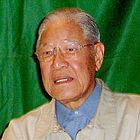ROC presidential election, 1996
|
|
|||||||||||||||||||||||||||||||||||||||||||
|---|---|---|---|---|---|---|---|---|---|---|---|---|---|---|---|---|---|---|---|---|---|---|---|---|---|---|---|---|---|---|---|---|---|---|---|---|---|---|---|---|---|---|---|
|
|||||||||||||||||||||||||||||||||||||||||||
| Turnout | 76.04% | ||||||||||||||||||||||||||||||||||||||||||
|
|||||||||||||||||||||||||||||||||||||||||||

|
|||||||||||||||||||||||||||||||||||||||||||
|
|||||||||||||||||||||||||||||||||||||||||||
The election of the ninth-term President and Vice-President of the Republic of China (第九任中華民國總統 、副總統選舉) was the first direct presidential election in the history of the Republic of China. It occurred on 23 March 1996. In the previous eight elections the president and vice president had been chosen in a ballot of the deputies of the National Assembly, in accordance with the 1947 constitution.
The outcome of the 1996 election was that Lee Teng-hui was elected as President and Lien Chan as Vice President. Lee stood as the incumbent, and as the candidate of the ruling Kuomintang. He won a majority of 54% of the votes cast. His election followed missile tests by the People's Republic of China. These were an attempt to intimidate the Taiwanese electorate and discourage them from supporting Lee, however the tactic backfired. Voter turnout was 76.0%.
The ruling Kuomintang nominated president Lee Teng-hui in August 1995 at its 14th Party Congress after plans to institute a closed primary system by his opponents were thwarted. As his running mate, Lee chose Lien Chan, who had attempted to resign his position as Premier of the Republic of China to join Lee's ticket. Lee did not accept Lien's resignation, as Lien's potential successors to the premiership stood little chance of legislative confirmation. After the election, the Judicial Yuan allowed Lien to keep both posts.
The opposition Democratic Progressive Party conducted an extensive nomination process: the presidential candidate was selected after two rounds of voting and fifty public debates by the two finalists. Hsu Hsin-liang, Lin Yi-hsiung, You Ching, and Peng Ming-min contended for this position. The seventy-two-year-old Peng emerged victorious and nominated legislator Frank Hsieh to be his running mate. Peng opposed trade with mainland China unless the PRC promised to "treat Taiwan as an equal." Though he argued that the One-China policy would lead to another February 28 Incident, he took the position that Taiwan was already de facto independent so a formal declaration of Taiwan independence was unnecessary unless the PRC attacked. However, Peng rejected reunification with the mainland outright, describing the notion as "suicide" and "self-destruction."
...
Wikipedia


